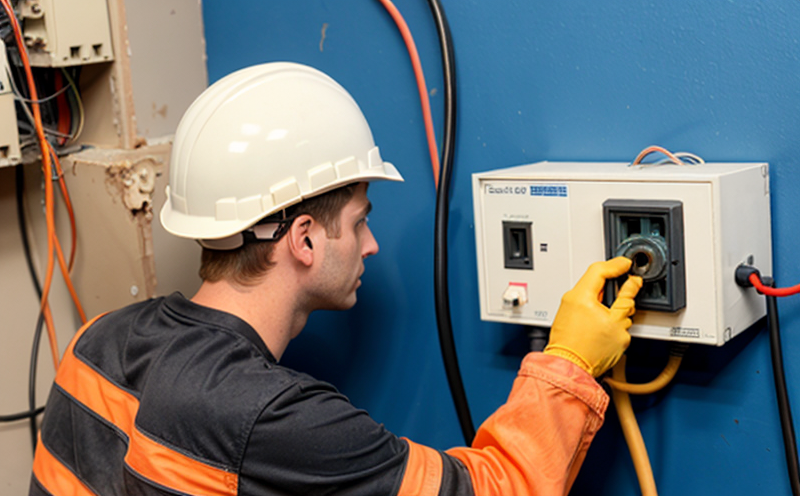IEC 60601-1 Battery Overdischarge Protection Testing
The International Electrotechnical Commission (IEC) standard IEC 60601-1 is a foundational guideline for the safety assessment of medical electrical equipment and related devices. This standard ensures that healthcare products do not pose unreasonable risks to patients, users, or others during normal use and in foreseeable misuse.
One critical aspect addressed by this standard pertains to battery overdischarge protection, which prevents batteries from being discharged beyond a safe limit. Overdischarge can lead to battery damage and potential safety hazards, especially in medical devices that rely on reliable power supply for critical functions. This service ensures compliance with the specific requirements outlined in IEC 60601-1 concerning battery overdischarge protection.
The testing procedure involves subjecting batteries used in medical devices to controlled discharging conditions to evaluate their ability to prevent overdischarge. The goal is to ensure that when a device's power supply is depleted, the battery will not continue to discharge below a specified threshold, thereby preserving its integrity and preventing any potential risks.
This testing protocol requires meticulous preparation of the specimen, which involves selecting batteries that are typical for use in medical devices under test. The specimens must be compatible with the intended electrical loads and environmental conditions. Once prepared, they undergo controlled discharging to simulate real-world scenarios where overdischarge might occur.
The instrumentation used during this testing is highly sophisticated and adheres strictly to IEC 60601-1 standards. This includes calibrated discharge equipment capable of monitoring the voltage and current throughout the process with precision. The acceptance criteria for successful completion of the test include maintaining a specified minimum voltage level until the battery reaches its natural cutoff point without further manual intervention.
The results of this testing are detailed in comprehensive reports that provide insights into the performance of the batteries under controlled conditions. These reports serve as critical documentation for regulatory compliance and quality assurance purposes, ensuring that manufacturers meet international safety standards for medical devices.
Understanding the importance of battery overdischarge protection within the context of IEC 60601-1 underscores why this testing is essential. It helps prevent potential hazards associated with compromised batteries in life-critical applications such as defibrillators, monitoring equipment, and other essential medical tools.
Why It Matters
The significance of battery overdischarge protection cannot be overstated. In the realm of medical devices, reliability is paramount. A single malfunction due to improper battery management can have severe consequences, ranging from inconvenience to life-threatening situations.
- Increased Reliability: By ensuring that batteries do not discharge beyond safe limits, we enhance the overall reliability and longevity of medical devices.
- Patient Safety: Preventing overdischarge minimizes risks associated with compromised battery performance during critical procedures.
- Regulatory Compliance: Adherence to IEC 60601-1 standards is not only a legal requirement but also demonstrates a commitment to patient safety and quality assurance.
- Consumer Confidence: Reliable products build trust with healthcare professionals and patients alike, leading to better acceptance of innovative medical technologies.
In essence, IEC 60601-1 Battery Overdischarge Protection Testing is a cornerstone for ensuring that medical devices function safely and effectively under all conditions. This service plays a vital role in safeguarding patient welfare while facilitating the development of cutting-edge medical technology.
Industry Applications
- Defibrillators: Ensuring that these devices maintain battery integrity is crucial for rapid and effective operation during cardiac emergencies.
- Monitoring Equipment: Continuous monitoring of vital signs depends on reliable power supply, which this testing helps to guarantee.
- Nursing Stations: Portable nursing stations often rely on battery-powered systems that must operate seamlessly throughout shifts.
- Anesthesia Machines: Proper function is essential for safe anesthesia administration in surgical settings.
- MRI Machines: While primarily electric, MRI machines have backup batteries to ensure continuous operation during power outages.
- Critical Care Units: Hospitals often have critical care units that depend on battery-powered equipment for patient monitoring and treatment.
The importance of this testing in ensuring the safety and reliability of these devices underscores its relevance across various healthcare settings, from emergency rooms to intensive care units.
Eurolab Advantages
At Eurolab, our commitment to excellence in medical device testing is reflected in the services we offer. Our expertise and state-of-the-art facilities ensure that you receive accurate, reliable results tailored specifically for your needs.
- ISO/IEC 17025 Accreditation: Our laboratory meets the highest standards set by international bodies, ensuring confidence in our testing processes.
- Experienced Staff: Our team comprises highly skilled professionals with extensive experience in medical device compliance and safety assessment.
- Customized Solutions: We understand that every client has unique requirements. Our services are tailored to meet those specific needs, whether they involve regulatory compliance or product development.
- Comprehensive Reporting: In-depth reports not only document the results of your testing but also provide valuable insights into areas for improvement and future considerations.
We pride ourselves on providing a seamless experience from initial consultation through to final report delivery. Our goal is to support you in achieving compliance with IEC 60601-1 standards, thereby enhancing the safety and reliability of your medical devices.





